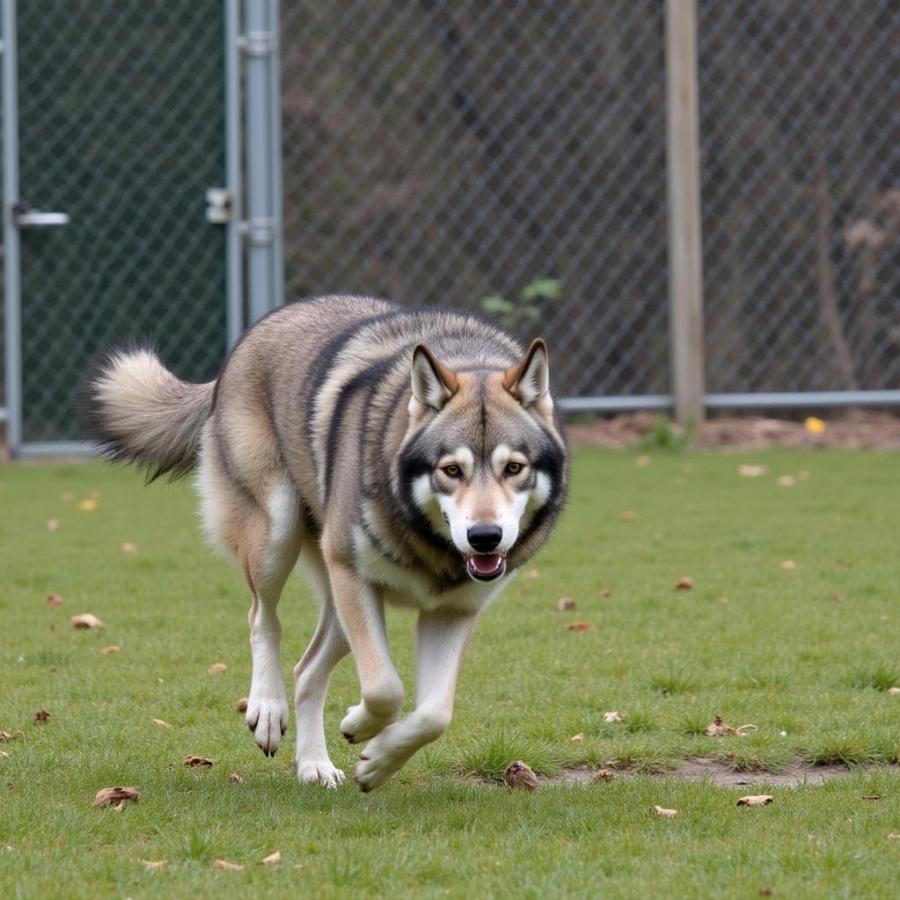Wolf dogs, those captivating canines with a touch of wild in their eyes, have captured the fascination of many. A quick search for “wolf dog pics” reveals a plethora of stunning images, showcasing their striking resemblance to their wolf ancestors. But behind these beautiful photographs lies a complex reality of owning a hybrid animal. This article delves into the world of wolf dogs, exploring their unique characteristics, the challenges of ownership, and the ethical considerations surrounding these magnificent creatures.
Decoding the Appeal of Wolf Dog Pics
Why are wolf dog pics so popular? Perhaps it’s the allure of the wild, a connection to untamed nature embodied in these captivating creatures. Their piercing gaze, thick coats, and powerful build evoke a sense of awe and mystery. But it’s crucial to remember that these captivating images represent real animals with specific needs, and potential owners must be fully prepared for the commitment involved.
Navigating the World of Wolf Dog Ownership
Owning a wolf dog is significantly different from owning a typical domestic dog. Their inherent wild instincts can make training and socialization more challenging. They require experienced owners who understand their unique needs and can provide a safe and enriching environment. This includes secure fencing, specialized diets, and a deep understanding of canine behavior, particularly that influenced by wolf ancestry. Are you considering bringing a wolf dog into your life? If so, it’s essential to be fully informed and prepared for the responsibility. Learn more about the responsibilities of dog ownership by reading our article on dogs with pricked ears.
What Should I Know Before Getting a Wolf Dog?
Wolf dogs aren’t suitable for everyone. Their high energy levels and potential for destructive behavior require significant time, patience, and resources. Before considering wolf dog ownership, thorough research is vital. Understanding their specific needs, legality in your area, and the potential challenges are crucial steps in responsible ownership. It’s also important to learn about the specific traits of different dog breeds, such as the shiloh shepherd dog.
 Wolf Dog Playing in a Securely Enclosed Area
Wolf Dog Playing in a Securely Enclosed Area
The Ethical Dilemma of Wolf Dog Breeding
The breeding of wolf dogs raises ethical concerns. The welfare of the animals involved should always be the top priority. Furthermore, the release of wolf dogs into the wild poses a threat to both the animal and the existing ecosystem. Responsible breeders prioritize the health and temperament of their animals, and potential owners should be thoroughly vetted to ensure a suitable home. Choosing a suitable name for your hunting dog is also important; find some inspiration in our article on best hunting dog names.
Are Wolf Dogs Legal?
The legality of owning a wolf dog varies significantly depending on location. Some areas have outright bans, while others require permits or impose specific restrictions. It’s crucial to research and understand the laws in your area before acquiring a wolf dog. This will help you avoid potential legal issues and ensure the well-being of the animal. Understanding the legal aspects of pet ownership is crucial, and similar regulations apply to other breeds, like the information found in our article on black fluffy dogs.
Beyond the Pictures: The Reality of Wolf Dogs
While wolf dog pics can be breathtaking, they only tell part of the story. These animals are complex and demanding, requiring a dedicated and experienced owner. Responsible ownership involves a commitment to understanding their unique needs, providing a suitable environment, and prioritizing their well-being. This includes understanding their specific health needs and potential genetic predispositions. Are you fascinated by the unique features of certain dogs, such as eye color? Our article on what type of dogs have blue eyes might be of interest.
Conclusion
Wolf dogs are undeniably captivating creatures. Their striking resemblance to wolves, as seen in countless “wolf dog pics,” draws many to their unique charm. However, the decision to own a wolf dog should not be taken lightly. It requires careful consideration, thorough research, and a commitment to responsible ownership. Understanding their complex needs and the ethical considerations involved is essential for ensuring the well-being of these magnificent animals.
FAQ
- Are wolf dogs good pets? Wolf dogs can make challenging pets due to their wild instincts and high energy levels. They are not suitable for first-time dog owners.
- How much does a wolf dog cost? The cost of a wolf dog can vary significantly, depending on the percentage of wolf content and the breeder.
- What do wolf dogs eat? Wolf dogs require a specialized diet that may include raw meat, bones, and dog food formulated for high-energy breeds.
- How long do wolf dogs live? The lifespan of a wolf dog is typically similar to that of a large breed dog, ranging from 10-15 years.
- Are wolf dogs aggressive? Wolf dogs are not inherently aggressive, but their behavior can be unpredictable due to their wild instincts. Proper socialization and training are crucial.
- Can wolf dogs be trained? Training a wolf dog requires patience, consistency, and a deep understanding of canine behavior.
- Where can I find a reputable wolf dog breeder? Researching and finding a reputable breeder is essential to ensure the health and well-being of the animal.
Beaut Dogs is your go-to resource for all things canine, offering expert advice and valuable insights into the world of dogs. We are passionate about providing accurate and up-to-date information to help you make informed decisions about dog ownership. For personalized guidance and detailed answers to your questions, please reach out to us via Email at [email protected]. We are here to support you on your journey with your furry friend. Beaut Dogs provides comprehensive information and resources for dog lovers, from breed-specific details to general care tips. Visit https://beautdogs.com today to learn more!